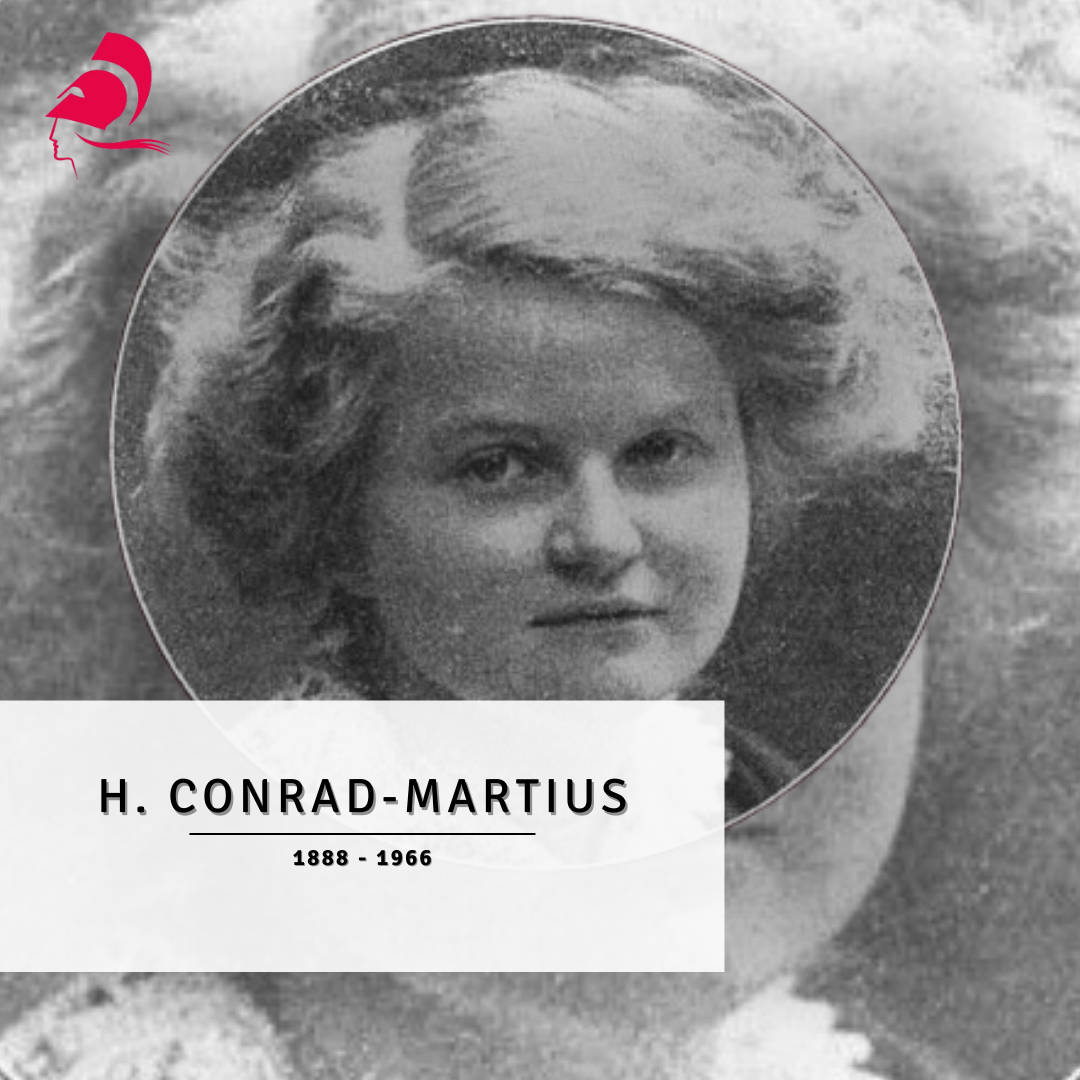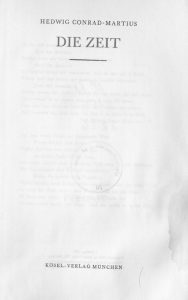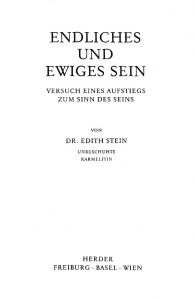A history in half.
We need the legacy of women philosophers.

“As soon as the creature wants to overcome the fear and danger of momentariness, founded in the constitutive tension between being and non-being, in a direct and temporal manner, by safeguarding itself [‘concerning’ itself!] in and into time, it builds, absolutely speaking, into the void. Every attempt to build (into) temporality – and it must and may happen, as long as the final has not arrived yet! – remains constitutively a stopgap, whose confirmation or annulation from moment to moment depends anew on God’s sovereignty. For it is not the temporal dwelling that can and may save us, but only the readiness to do God’s will. It is exactly what the creature is afraid of, the moment, which saves it! For here it is continuously held by the eternal life itself. Here, everything is possible. But only here.”
– Hewig Conrad-Martius: “Die Zeit. Ontologisch-metaphysische Untersuchung”, in: Schriften zur Philosophie. Erster Band (1963), 183.
Hedwig Conrad-Martius and Edith Stein have both developed unique accounts of what it means for a finite thing to exist. First and foremost, temporal existence is ontologically characterized by obtaining only from moment to moment, such that real duration cannot adequately be predicated of existing things. Only eternal being is actually (in the sense of being in actu). It remains what it is through, or even beyond time. For both Conrad-Martius and Stein, finite being is necessarily intertwined with infinite or eternal being, whether as its image (Abbild), or its ontic opposite.[1] The phenomenological question being raised is this: What is the experience of the momentariness of existence in itself, without its relation to an infinite being that somehow grounds, preserves or, as Conrad-Martius puts it, “saves”[2] it from moment to moment?
The Philosophy of Time of Hedwig Conrad-Martius: Non-Ownership of Time
 Hedwig Conrad-Martius’ philosophy radically pulls the rug from under our experience of time. Whereas we imagine time to be extended both into the past and the future based on an ever shifting “now”, ontically, the situation is much more precarious. According to Conrad-Martius, we temporally exist only for the fleeting moment in which our being is set over and against nothingness. We do not remain in time. Instead, we exist only in punctiform actuality. These moments of actual existence do not connect to afford us the seamless flow of time we experience. And this is necessarily so because time only ever is this specific moment which comprises the finite existence of beings. Time is a movement of discreet instances of actuality. Every extension of this moment beyond this very actuality is by nature purely imaginary, pertaining to our capacity to remember and expect, but not to our ontic being.
Hedwig Conrad-Martius’ philosophy radically pulls the rug from under our experience of time. Whereas we imagine time to be extended both into the past and the future based on an ever shifting “now”, ontically, the situation is much more precarious. According to Conrad-Martius, we temporally exist only for the fleeting moment in which our being is set over and against nothingness. We do not remain in time. Instead, we exist only in punctiform actuality. These moments of actual existence do not connect to afford us the seamless flow of time we experience. And this is necessarily so because time only ever is this specific moment which comprises the finite existence of beings. Time is a movement of discreet instances of actuality. Every extension of this moment beyond this very actuality is by nature purely imaginary, pertaining to our capacity to remember and expect, but not to our ontic being.
Conrad-Martius’ philosophy of temporality aims to open our eyes to the Augenblick as the only pertinent form of reality, whereas projections and projects turn out to be precarious bridges into the nothingness of the inactual dimensions of past and future. What we have to understand is the provisional character of these projections, not just because they represent a reality that is not yet actual, but because they are based on an imaginary concept of time, a time which can never become real in the way we envision it. To “authentically” experience time is to trust in the safeguarding of one’s own existence from moment to moment:
“As soon as the creature wants to overcome the fear and danger of momentariness, founded in the constitutive tension between being and non-being, in a direct and temporal manner, by safeguarding itself [‘concerning’ itself!] in and into time, it builds, absolutely speaking, into the void. … It is exactly what the creature is afraid of, the moment, which saves it! For here it is continuously held by the eternal life itself. Here, everything is possible. But only here.”[3]
A key feature of finite being’s existence is therefore its “non-ownership” of time: Because time does not exist before the entity exists, existence “never reaches itself” in time. It cannot take possession of itself in a real way, but only phenomenally through what we might call with Husserl retention and protention. Even if the entity exists in its own time, insofar as time is a formal dimension of its own existence, it does not have it. Implicated here is a contradiction that has to do with the Conrad-Martius’ notion of substance: on the one hand, a finite entity, being a substance, exists on its own ground, but on the other hand, it remains, as actual being, constantly on the verge of nothingness. In other words, the self-subsistence that allows one to speak of the being of the substance is at the same time constantly threatened by non-existence. In existing, finite beings are inherently impermanent substances.
The Philosophy of Sense of Edith Stein: Non-Ownership of Sense
 Similar to Conrad-Martius, Edith Stein’s considerations on temporality demarcate an absolute limit between presence and non-presence, a limit from which the main ideas about finite existence can be unfolded:
Similar to Conrad-Martius, Edith Stein’s considerations on temporality demarcate an absolute limit between presence and non-presence, a limit from which the main ideas about finite existence can be unfolded:
„Actual being is, in the moment in which it is, akin to being as such, whose fullness does not change through time. But because it is only for the moment, it is not full being in the moment either, its fugacity is already implied in its momentary being, itself merely an ‘analog’ to eternal being, which is immutable and thus full being in every moment: i.e., an image, having similarity with the archetype, but being overall much more dissimilar to it.”[4]
In the Augenblick, finite being is similar to eternal being. For this instant, it does not change but completely is what it is. All the potential of the finite entity finds its utmost expression in the instant as it could not be any more actual. But then again, in the Augenblick, finite being is only like eternal being, a mere image of it, despite its being fully actual. Why is this so? This is the case, as Stein says, because it is only actual for this instant. Thus, even though finite being is fully actual, its actuality is threatened and even fractured from the inside out. Compared to God’s existence in actu, the actuality of finite beings is merely the most extreme case of potentiality, being momentarily actualized.
Stein finds that a finitely existing entity experiences being under a double aspect, namely as being and as non-being. If I focus on my own temporal mode of existence, I notice that the being I am now is always already different. Stein does not conceive of this in terms of a cogito or a pure I that would itself remain unaffected by what it observes. On the contrary, I am the very being that I understand to be in constant change, I am existentially implicated in the simultaneous present and non-present of my experience. In other words, I am “swept along with” the time that I understand to pass from moment to moment. From this mediation arises – as its opposite – the idea of a “pure being” that subsists beyond change. The pure actuality of eternal being is analogous to the “impure” actuality I experience as my own.
What gives actual existence its coherence, what stops the “pure I” from collapsing into empty actuality, is itself non-temporal, that is, essential. My feeling of joy is not simply the expression of my individual being. For instance, joy is something in itself, ultimately it is the sense that makes every instance of joy what it is. When I feel joy, I partake in a general sense that I share with others, as it is the same for each of us to be joyful. And yet, this joy is not akin to a Platonic idea that I merely “happen to realize”. In as much as I am able to feel this joy, it has to be considered part of my essence as well, for I am prone to a certain kind of joy under certain circumstances. In other words, what realizes itself in and though my existence is simultaneously general and individual.
According to Edith Stein, our experience is interspersed with a metaphysics of sense which we discover, rather than create. We experience these essences (that of joy for instance) from out of our own temporality, but it is important to see that they also structure our experience. I can only feel joy because there is an objective sense of what joy is. The “pure I” of actual experience is shown by Stein to be reliant on non-temporal objectivity, informing its experience. As Mette Lebech notes regarding the metaphysics of Edith Stein, humans experience themselves “as open to the eternal meaning of being”[5]. In parallel to the idea of a non-ownership of temporality in Conrad-Martius, one can find here a non-ownership of sense.
Conrad-Martius and Stein on the Augenblick
Both Stein and Conrad-Martius attribute existential significance to the Augenblick because it is in the form this moment that I can know myself perpetually saved (Conrad-Martius), or as standing in some relation to eternal being. Primaril, the Augenblick refers to the very transcendence of the world afforded by my finite existence. We find here a sense of reality that is undergirded by the certainty that, in each and every moment, my experiencing relies on something else, time and sense, that informs it.
One could take Conrad-Martius’ idea that finite being knows itself, in the Augenblick, to be momentarily saved, as constituting a unique concept of finitude, not demarcated by one’s mortality, but by the ability to partake in an infinity of sense and time. While neither Stein nor Conrad-Martius conflate finite experience with any form of infinity, they both view the contraction of finite existence into a point – into the Augenblick – as finite existence surpassing itself.
For a fuller treatment see: Daniel Neumann, A Phenomenological Actus Essendi? Hedwig Conrad-Martius and Edith Stein on Finite Existence. (Open Access)
[1] Cf. Stein (2006, 45) and Conrad-Martius (1963, 190).
[2] Cf. Conrad-Martius (1963, 169).
[3] Ibid. All translations are by the author.
[4] Stein (2006, 42).
[5] Lebech (2015, 144).
Bibliography
Conrad-Martius, Hedwig. 1963. „Die Zeit“. In Schriften zur Philosophie I, 101-184. München: Kösel.
Lebech, Mette. 2015. The Philosophy of Edith Stein. From Phenomenology to Metaphysics. Bern: Peter Lang.
Stein, Edith. 2006. Endliches und ewiges Sein. Versuch eines Aufstiegs zum Sinn des Seins (Edith Stein Gesamtausgabe 11/12). Freiburg i. Breisgau: Herder.
You cannot copy content of this page








